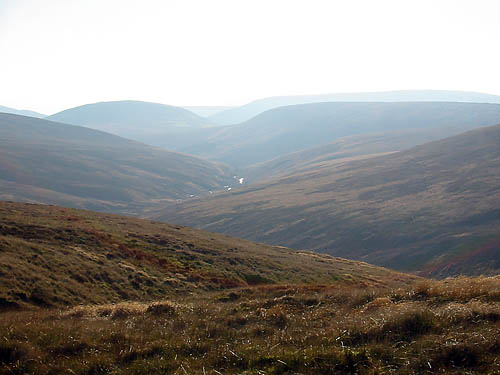 The United Kingdom’s uplands are in crisis. They are neglected, damaged and in decline.
The United Kingdom’s uplands are in crisis. They are neglected, damaged and in decline.
Despite farming dominating land use, its economic benefit has been overtaken by outdoor tourism. Many of our protected wildlife areas are in dire condition. These are the conclusions of a wide-ranging report which, if its authors’ hopes are realised, could radically change our moors, mountains and fells.
Bowland in Lancashire: the RSPB has been working with land managers
The unlikely source of this comprehensive but very readable document is not a Government agency, not a walkers’ or climbers’ pressure group, but a charity which fights the corner for Britain’s birds.
The Royal Society for the Protection of Birds (RSPB) says it wants to start a debate on how we use our cherished uplands. It has more questions than answers, but its conclusions include:
- Recognising that our uplands are vital for providing modern society’s needs and values
- Protecting mountains, fells and moorlands as the country’s green lungs rather than seeing them as an unproductive wasteland
- Placing them at the centre of a rural renaissance
- Changing the way we subsidise those who manage the land, to support those who look after them for us all.
More than 100 million day visits are made each year to these landscapes. The virtual closure of the countryside in a disastrous overreaction to the foot-and-mouth disease outbreak of 2001 cost billions of pounds to the British economy.
The RSPB paper The Uplands: Time for a Change? Is well worth a look. It contains many fascinating facts and cogent arguments for a new approach to managing our countryside. Indeed, it’s the kind of document we’d expect bodies such as Natural England or Scottish Natural Heritage to have commissioned. We recommend a look.
Hills, moors, valleys and mountains make up 40 per cent of the UK land area. The RSPB says decades of neglect have left them in a parlous state. More than a third of the features deemed important in Sites of Special Scientific Interest are in an ‘unfavourable’ condition. Pollution of our drinking water, up to 90 per cent of which comes from water gathered on these uplands, is increasing, with dissolved organic matter doubling in the last 20 years.
Importantly, in the light of recent events, the report says flooding risk is affected by land management on the higher areas of our country. The peat bogs so common on Britain’s moors are a store of carbon, with 5 billion tonnes of the stuff ready to be released if the gradual drying out continues as it has.
There’s an understandable emphasis on birds and their habitats, but the report is much wider and should be essential reading for walkers, climbers, paddlers, Government ministers, farming representatives and anyone else who loves our mountains and moorlands.
Changes to the uplands may mean we face increased fire risk on the moors; Scottish ski resorts will probably struggle to survive; common heathland species such as red grouse may retreat into smaller areas to the North and Britain’s wetlands could dry out.
Crucially, taxpayers are not getting value for money from the land-management schemes currently subsidising custodians of the country’s high ground. The RSPB says it’s time to change that.
The society’s director of conservation Dr Mark Avery said: “The future of the uplands is too important to be left to chance. We are talking about half the area of the UK – the half that has not been ravaged by development and production.
“This summer's floods highlight all too clearly the relationship between mankind and nature. The RSPB has some ideas about the changes it would like to see in the uplands, but no-one has all the answers.
“We want a national debate and we would urge everyone with a stake in and a love for the uplands to take part. It is crucial we make the right choices now.”
It’s not all doom and gloom: our uplands are valuable and useful. Dr Avery continued: “Managed properly, our upland soils can continue to store huge amounts of carbon, soaking up thousands of tonnes a year which would otherwise contribute to global warming.
“They can store rainwater, releasing it safely and reliably. All this, while offering a physical refuge for some of our best loved plants and animals and a spiritual refuge from the pressures of modern life.
“We have to give proper recognition to the services our uplands provide and proper reward to those who manage the land in a way that delivers them.
“We have to find common ground and a shared vision to give our cherished uplands, their people and their wildlife a future.”
The RSPB quotes the Grumpy Old Fellwalker himself in its report: “Alfred Wainwright suggested that the English Lakeland Fells ‘are a perfect cure for urban depression.’ We agree.”
The society wants your views and hopes the report will be the catalyst for a radical change in the approach to how we use and manage the country’s best scenery. Read the report and let them know what you think about how we use our uplands.